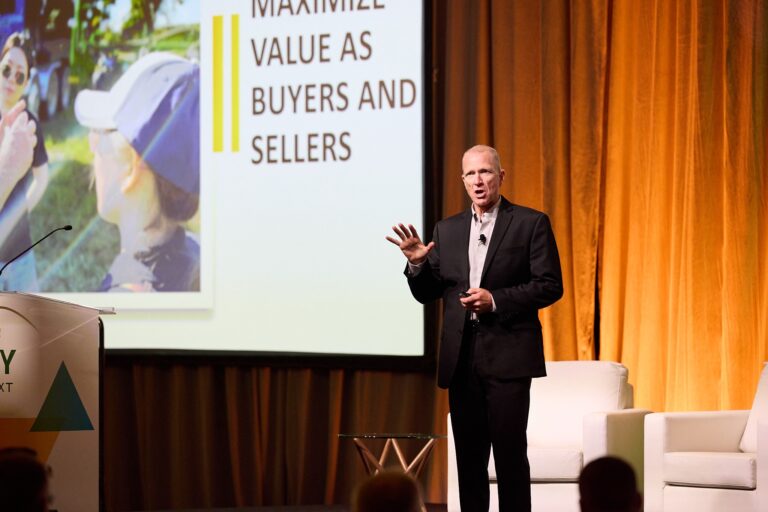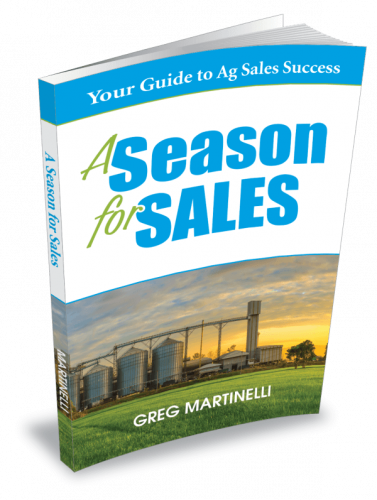Dairy boots and getting “Robbed”
Every customer has a customer! This is so important for salespeople to understand that I want to repeat it. Every customer has a customer! If you sell to an agribusiness like a feed mill, grain elevator or Ag retailer, then that is obvious. However, you might be thinking that since you sell direct to farmers, this doesn’t apply to you.
But think about a farm. It’s a business. Yes, they might be the end user of your fertilizer or tractor, but the consumer chain is just getting started. The sooner you realize this, the sooner you can help your customer’s improve their business. To do this in training workshops, we work on how to ask better questions. In one exercise, we discuss the farmer’s customer and the farmer’s boss. Often, when I ask them who is the farmer’s customer, I get puzzled looks. Someone may even respond with something like, “the crops?” or “the soil”. Those are interesting and can be explored more, but I’m referring to an actual customer.
Farmers raise livestock and crops to sell them to someone: a grain elevator, the sale barn, the ethanol plant, etc. Farming is a business that produces a product for a customer. And every good business owner wakes up everyday and focuses on their customer.
No matter who you sell to, focus your next conversation on your customer’s customer and you will be amazed at how their eyes light up and dialogue flows. That’s who writes them a check. That’s who pays their bills. That’s who contributes to the top line of their P&L. Everyday, your customer wakes up and thinks about how they can serve their customer better. That’s why it’s so exciting for them to talk about their customer.
In the late 90s, we were working with our feed dealers to improve their retail skills. We were trying to improve store display techniques, product placement, customer service areas, etc. One area we dug into was product turnover. Meaning how fast a product on the shelf sold out and had to be restocked. As we walked through one dealership, there was six feet of shelf space dedicated to some dusty boxes of Tingley dairy boots. These are boots worn in the milk house. They were dusty because, as the dealer explained, they had been there since 1978. Not making this up. They had been there almost 20 years.
My question to you is, “Did that salesperson do what was right for the dealer or himself by loading them up on inventory and then disappearing?” Obviously, the answer is no. If he did, those products would have been returned decades ago. The sale you make to your dealer or distributor is just the beginning. I always felt that once the dealer buys from me, the hard work begins. You now need to train the staff on your products, get your products out of their warehouse and onto their store floor, price them, run promotions, and make sure they move. Without successfully completing all these action items, you haven’t really made a sale. You just put the upfront pressure on making a one-time sale by loading them up on inventory.
Several years later, we had a salesperson named Rob who left the company after only a year of being with us. Previously, Rob had been a pet food salesperson, knew many of our same customers and seemed like a great fit. Rob’s motto was, “Stack’em high and let’em fly.” Meaning, he liked to load up the dealer with big stacks of dog food and then let it fly off the shelves in sales. One problem. He was only good at the “Stack’em High” part. Not so good at helping his dealers “Let’em fly”.
After he left, I went to visit his dealers. Apparently, things had not been going well with Rob and his dealers. One dealer referred to “getting Robbed”. When I asked what that meant, she said that her and her staff developed the term, “getting Robbed”. It referred to Rob putting in orders that were not actually ordered. For example, they may have ordered a pallet of dog food, but received two pallets of various pet food with many items not originally ordered. Since Rob rarely called on them after the initial sale, they would struggle trying to return the unordered products.
Again, my question is, “Did Rob do what was right for the dealer or himself by loading them up on inventory and then disappearing?” Obviously, the answer is no.
While these are two extreme examples, it points out the importance of your focus on your customer’s customer.
Here are some lead in questions to get the conversation going?
- How would you describe your best customers?
- How do they make decisions to buy from you versus your competition?
- When they shop here, how do they typically make decisions on which products they buy?
- Are those ideal customers profitable into the near or distant future?
- Who do your customers look to as the expert in the area of your products?
For your farmer customers, here are some questions to get them thinking about their customer:
- Have you ever thought of the grain elevator or the sale barn as your customer?
- How does your customer decide to buy from you, or what to pay you versus another farmer?
- Have you ever talked with them like they were your customer? Asked them about what is most important to them and why when they make their decisions?
- What is their biggest challenge when buying products like those you sell? What do they think is a good solution to those problems? What would it mean in value to them if they could solve that problem? (value is defined in terms of time, money or emotion).
- And since this article is all about helping our customer sell to their customer, you can ask your farmer customers, “Have you ever asked your customers about their customer?” For example, “Have you asked the feed mill about their customers in relation to your products?
At a minimum, your dealer customers will enjoy the discussion and increase their dialogue with you. Most salespeople are not talking about this subject. It also shows that you care about their success versus dumping product on them, which builds trust. So, more meaningful dialogue and increased trust. Not bad for a few new questions.
With your farmer customers, they most likely will give you a strange look and possibly a dismissive answer. They don’t usually view themselves as salespeople who need to focus on a customer. They typically grow what they want or what they think they can make a profit on. Since their products are viewed as a commodity, they feel everything can be sold to the local buyers. No need for discussions or selling process. Just deliver it and get paid what the market is paying.
Again, this is your chance to differentiate yourself from all the other salespeople calling on them. It’s a chance to plant the idea that everyone has a customer. And it’s typically the person writing them a check. This shift in thought process for some farmers can have a major impact on their profitability and success.


